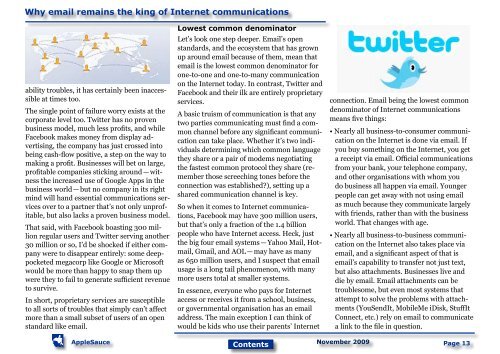AppleSauce, December 2009 - South Australian Apple Users' Club
AppleSauce, December 2009 - South Australian Apple Users' Club
AppleSauce, December 2009 - South Australian Apple Users' Club
You also want an ePaper? Increase the reach of your titles
YUMPU automatically turns print PDFs into web optimized ePapers that Google loves.
Why email remains the king of Internet communications<br />
ability troubles, it has certainly been inaccessible<br />
at times too.<br />
The single point of failure worry exists at the<br />
corporate level too. Twitter has no proven<br />
business model, much less profits, and while<br />
Facebook makes money from display advertising,<br />
the company has just crossed into<br />
being cash-flow positive, a step on the way to<br />
making a profit. Businesses will bet on large,<br />
profitable companies sticking around — witness<br />
the increased use of Google Apps in the<br />
business world — but no company in its right<br />
mind will hand essential communications services<br />
over to a partner that’s not only unprofitable,<br />
but also lacks a proven business model.<br />
That said, with Facebook boasting 300 million<br />
regular users and Twitter serving another<br />
30 million or so, I’d be shocked if either company<br />
were to disappear entirely: some deeppocketed<br />
megacorp like Google or Microsoft<br />
would be more than happy to snap them up<br />
were they to fail to generate sufficient revenue<br />
to survive.<br />
In short, proprietary services are susceptible<br />
to all sorts of troubles that simply can’t affect<br />
more than a small subset of users of an open<br />
standard like email.<br />
Lowest common denominator<br />
Let’s look one step deeper. Email’s open<br />
standards, and the ecosystem that has grown<br />
up around email because of them, mean that<br />
email is the lowest common denominator for<br />
one-to-one and one-to-many communication<br />
on the Internet today. In contrast, Twitter and<br />
Facebook and their ilk are entirely proprietary<br />
services.<br />
A basic truism of communication is that any<br />
two parties communicating must find a common<br />
channel before any significant communication<br />
can take place. Whether it’s two individuals<br />
determining which common language<br />
they share or a pair of modems negotiating<br />
the fastest common protocol they share (remember<br />
those screeching tones before the<br />
connection was established?), setting up a<br />
shared communication channel is key.<br />
So when it comes to Internet communications,<br />
Facebook may have 300 million users,<br />
but that’s only a fraction of the 1.4 billion<br />
people who have Internet access. Heck, just<br />
the big four email systems — Yahoo Mail, Hotmail,<br />
Gmail, and AOL — may have as many<br />
as 650 million users, and I suspect that email<br />
usage is a long tail phenomenon, with many<br />
more users total at smaller systems.<br />
In essence, everyone who pays for Internet<br />
access or receives it from a school, business,<br />
or governmental organisation has an email<br />
address. The main exception I can think of<br />
would be kids who use their parents’ Internet<br />
connection. Email being the lowest common<br />
denominator of Internet communications<br />
means five things:<br />
• Nearly all business-to-consumer communication<br />
on the Internet is done via email. If<br />
you buy something on the Internet, you get<br />
a receipt via email. Official communications<br />
from your bank, your telephone company,<br />
and other organisations with whom you<br />
do business all happen via email. Younger<br />
people can get away with not using email<br />
as much because they communicate largely<br />
with friends, rather than with the business<br />
world. That changes with age.<br />
• Nearly all business-to-business communication<br />
on the Internet also takes place via<br />
email, and a significant aspect of that is<br />
email’s capability to transfer not just text,<br />
but also attachments. Businesses live and<br />
die by email. Email attachments can be<br />
troublesome, but even most systems that<br />
attempt to solve the problems with attachments<br />
(YouSendIt, MobileMe iDisk, StuffIt<br />
Connect, etc.) rely on email to communicate<br />
a link to the file in question.<br />
November <strong>2009</strong><br />
<strong><strong>Apple</strong>Sauce</strong> Page 13<br />
Contents






